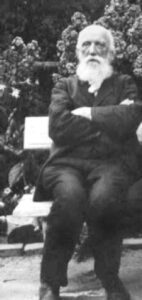Avi Ohry
Tel Aviv, Israel
 |
| Pavel Jacobi. Via Wikimedia. |
Pavel Ivanovich Jacobi (1841–1913), largely forgotten and rarely featured in the psychiatric literature, was a Russian socialist who made as great an impact on the treatment of the mentally ill as Jonathan Swift in Dublin, Phillipp Pinel in Revolutionary France, Father William Tuke and his sons in England, and Vincenzo Chiarugi in Italy.
He was1 a member of the Land and Liberty Society, a clandestine revolutionary organization around 1861–1864 that later became a political party as part of the Narodnik movement.2 He studied medicine in Heidelberg and Zurich, and was wounded during the Polish uprising of 1863. With his wife, a nurse, he served in Garibaldi’s Army of the Vosges,1 a body of foreign volunteers in the Franco-Prussian War against the French Empire of Napoleon III.3 Jacobi’s 1880 work Morality in Psychiatric Statistics became the basis for the monograph Man of Genius by Cesare Lombroso1 (1835–1909), an Italian-Jewish physician, eugenicist, criminologist, phrenologist, and founder of the Italian school of criminology.4
In 1890, Jacobi returned to Russia to work as a psychiatrist in clinics,1 where he implemented Pinel’s humanistic approach to the mentally ill. In his works Physiology of Thought he commented that psychiatry was still a “dark and mysterious area for the modern natural scientist,” but acquires every year greater significance in resolving social issues.5 His Chronicle of Natural Scientific Discoveries is a very updated sophisticated analysis.6 In another article he wrote that:
a dream, like wine, is necessary for all peoples, all tribes; just as the lack of good food, which restores the strength of the worker, fatally forces him to resort to guilt, a surrogate for it, so the lack of healthy mental activity, on the one hand, or a difficult mental state, a consequence of personal or social conditions, on the other, force a person to leave real life. Life in the world of fantastic dreams, the world is all the more pleasant that everyone builds it according to his own ideal the way he wants to have it.7
His 1869 review on natural sciences is also a clear and concise report on science.8 He also published, under a pseudonym, a Dictionary of Pseudonyms.9
More details about Jacobi were published in Little-known Pages of the Life of Pavel Ivanovich Yakobiy.10 It referred to his work on Korsakov syndrome and described his participation and injury in the Polish uprising:
In one of the battles, P.I. Jacobiy was seriously wounded. … “The Cossack knocked him off his horse with a pike. … [As he pretended to be dead,] several more Cossacks ran up and tore off his clothes and boots; apparently, they did not really believe that that he was dead, because one of them had shot him with a pistol, the bullet scratched only his side, despite the pain, he showed no signs of life. Finally, he heard one of them say: ‘[shoot] him in the forehead, otherwise, maybe he is still alive.’ He felt that they were aiming at him, but did not flinch; a shot rang out, and a bullet wound him in the face on the left and neck below the ear; despite the pain, he did not betray himself by the slightest movement, and this saved him. The Cossacks, saying ‘dead’, mounted their horses and left; only a few hours later he was picked up along with others by the peasants.
References
Links and Russian references available upon request.
- Pavel Jacobi. Wikipedia. https://en.wikipedia.org/wiki/Pavel_Jacobi.
- Land and Liberty (Russia). Wikipedia. https://en.wikipedia.org/wiki/Land_and_Liberty_(Russia).
- Army of the Vosges. Wikipedia. https://en.wikipedia.org/wiki/Army_of_the_Vosges.
- Cesare Lombroso. Wikipedia. https://en.wikipedia.org/wiki/Cesare_Lombroso.
- Yakobi PI. Physiology of Thought. 1867. (Physiologie de la pensee. Paris: M. Lelut; 1866.)
- Yakobi PI. Chronicle of Natural Scientific Discoveries.
- Yakobi PI. Psychological Studies. 1867.
- Yakobi PI. Natural Sciences. 1869.
- De-Kalonne. Dictionary of Pseudonyms. http://feb-web.ru/feb/masanov/map/05/map09849.htm.
- Schigolev II. Little-known Pages of the Life of Pavel Ivanovich Yakobiy.
AVI OHRY, MD, is married with two daughters. He is Emeritus Professor of Rehabilitation Medicine at Tel Aviv University, the former director of Rehabilitation Medicine at Reuth Medical and Rehabilitation Center in Tel Aviv, and a member of The Lancet‘s Commission on Medicine & the Holocaust. He conducts award-winning research in neurological rehabilitation, bioethics, medical humanities and history, and on long-term effects of disability and captivity. He plays the drums with three jazz bands.
Spring 2023 | Sections | Psychiatry & Psychology

Leave a Reply